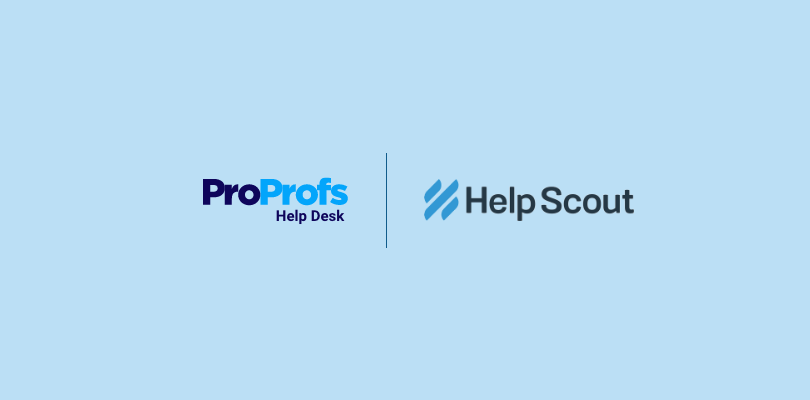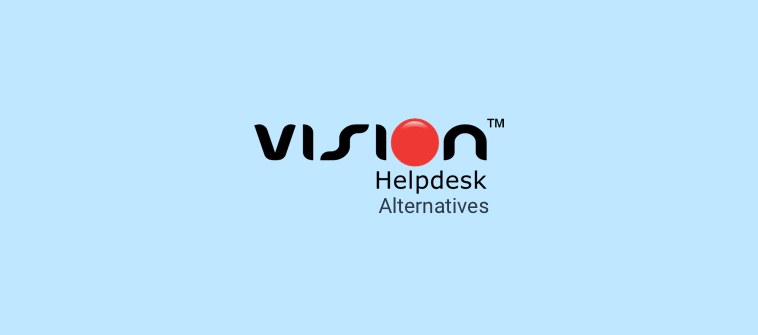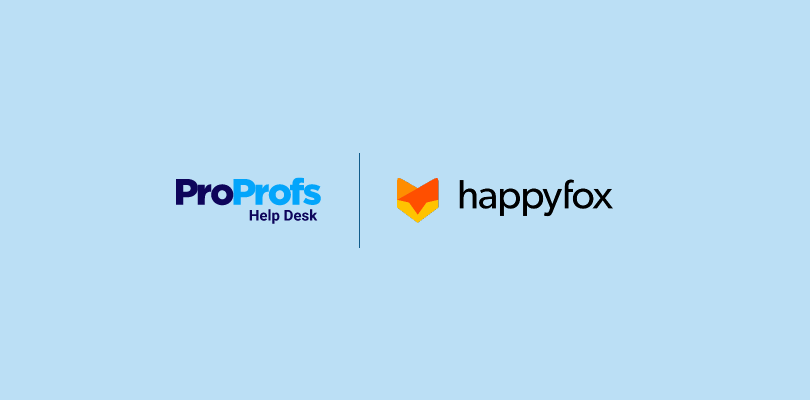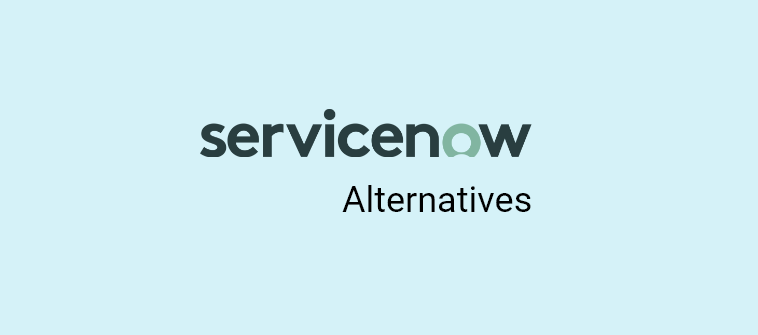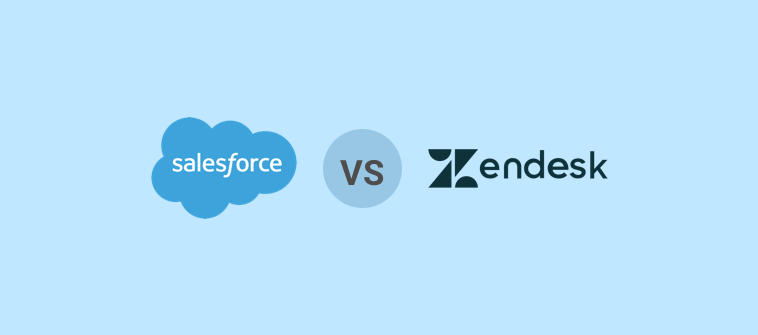If you’re still using the eDesk ticketing system in 2026, you could miss out on a lot.
Being a part of the customer support industry for over a decade, I have seen the help desk landscape evolve quite a bit. In fact, there are lots of eDesk alternatives that can deliver much better outcomes.
Let’s get straight to the point.
In this blog, I’ve curated a list of the best eDesk alternatives and competitors that can enhance your customer support efforts.
Let’s check them out.
| Tool | Best Use Case | Starting Cost |
|---|---|---|
| ProProfs Help Desk | Best for Help Desk & Support Ticketing for Customer Delight | Forever FREE for a single user. Paid start at $19.99/user/month |
| Intercom | Best for Streamlining Support Workflows | Starts at $29/seat/month. Billed annually. |
| Zoho Desk | Best for Context-Driven/Contextual Support | Starts at $25/organization/month. Billed annually. |
| LiveAgent | Best for Chat-Based Support | Starts at $9/agent/month. Billed annually. |
| OneDesk | Best for Time Tracking on Support Tickets | Starts at $11.99/user/month. Billed annually. |
| Freshdesk | Best for Multichannel Communications | Starts at $15/agent/month. Billed annually. |
| Zendesk | Best for Large Businesses & Enterprises | Starts at $55/agent/month. Billed annually. |
| Salesforce Service Cloud | Best for AI-Powered Customer Service | Starts at $25/user/month. Billed annually. |
Which Is the Best Alternative to eDesk?
Before we dive deep into the best alternatives to eDesk, here’s a quick review of the top 3 recommendations:
Option 1: ProProfs Help Desk
ProProfs Help Desk offers excellent ticket prioritization and assignment features, including automation like auto-assigning and email-based ticket creation. Its seamless integration with knowledge bases helps reduce incoming tickets by up to 80%, making it ideal for businesses focused on enhancing customer satisfaction and improving support efficiency.
Option 2: LiveAgent
LiveAgent excels in chat-based support with real-time communication through live chat widgets, reducing ticket volume. Its ability to handle multiple chats simultaneously and escalate them to tickets when needed enhances efficiency. The platform integrates emails, calls, and social media into one unified system, streamlining support processes.
Option 3: Zendesk
Zendesk is known for handling high ticket volumes, and its reporting dashboard provides valuable insights for optimizing team performance. It’s ideal for large-scale operations seeking robust features, as it integrates into over 1,000 apps, such as Slack and Salesforce.
Best eDesk Alternatives & Competitors in 2026
Here is a detailed review of some of the best eDesk competitors and alternatives that I have used. Let’s check out the features, pros, cons, and pricing of each tool to get a better idea.
1. ProProfs Help Desk – Best for AI Help Desk & Support Ticketing for Customer Delight
I have been using ProProfs Help Desk for the last three years, and this tool offers an excellent system for prioritizing and assigning tickets, ensuring that every query gets the attention it deserves.
I particularly appreciate AI capabilities like intent summary and response suggestions. Also, automation features, like canned responses, auto-assigning, and email-based ticket creation, helped my team respond faster.
The system integrates seamlessly with knowledge bases, helping customers find answers on their own, which can drastically reduce incoming tickets.
For a business that prioritizes customer satisfaction and wants to keep things smooth for both support agents and customers, ProProfs Help Desk is an ideal choice.
What You’ll Like:
- It offers a shared inbox that ensures all agents have access to customer emails for seamless collaboration.
- The tool allows you to track, manage & organize customer emails with its smart email management tool.
- It allows you to manage all your customer-facing inboxes in one place with its email ticketing support
- Canned responses to save valuable time and effort during customer service.
What You May Not Like:
- No downloadable or on-premise version.
- The dark user interface option is not available.
Pricing:
FREE for a single user. Plans start at $19.99/user/month for 2 or more users.
2. Intercom – Best for Streamlining Support Workflows
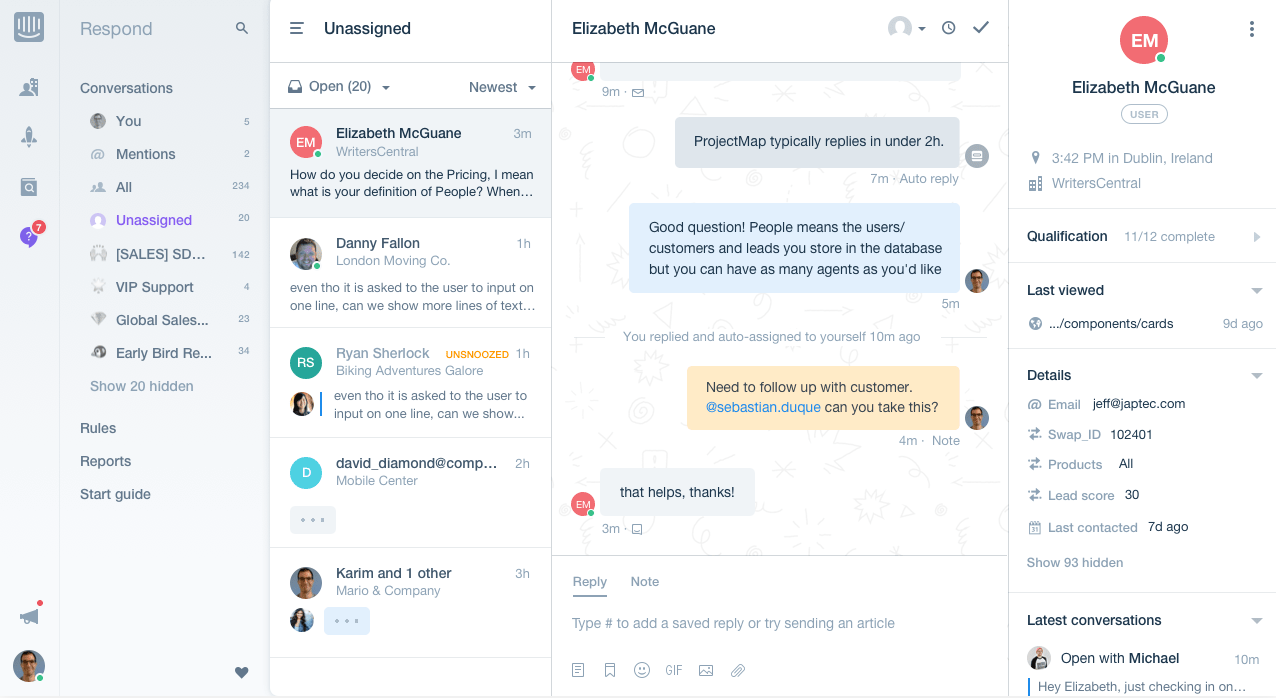
Intercom is a tool I’ve often used when I needed to streamline support workflows efficiently. One thing that stands out is its powerful automation. You can automate responses to repetitive queries, create customer segments, and set up workflows that significantly cut down on manual tasks.
Compared to eDesk, Intercom’s ability to streamline support from initial outreach to resolution is exceptional. I’ve seen how the integration of messaging, email, and bots into one platform enhances the support team’s efficiency.
Also, the live chat and CRM functionalities allow for easy follow-ups, making sure no ticket is ever missed.
What You’ll Like:
- Intercom provides real-time messaging, helping teams deliver faster responses to customer queries.
- It supports targeted messaging based on user behavior, ensuring more personalized customer engagement.
- The tool offers an in-app support feature, allowing you to help users within your product.
- Intercom’s integrations with CRM tools are seamless, making it easy to align sales and support efforts.
- It provides detailed customer profiles, allowing agents to see a customer’s history at a glance.
What You May Not Like:
- The reporting feature lacks customization options compared to other helpdesk software.
- Limited offline functionality means it’s primarily suited for businesses that rely heavily on real-time communication.
Pricing:
Starts at $29/seat/month. Billed annually.
3. Zoho Desk – Best for Context-Driven/Contextual Support
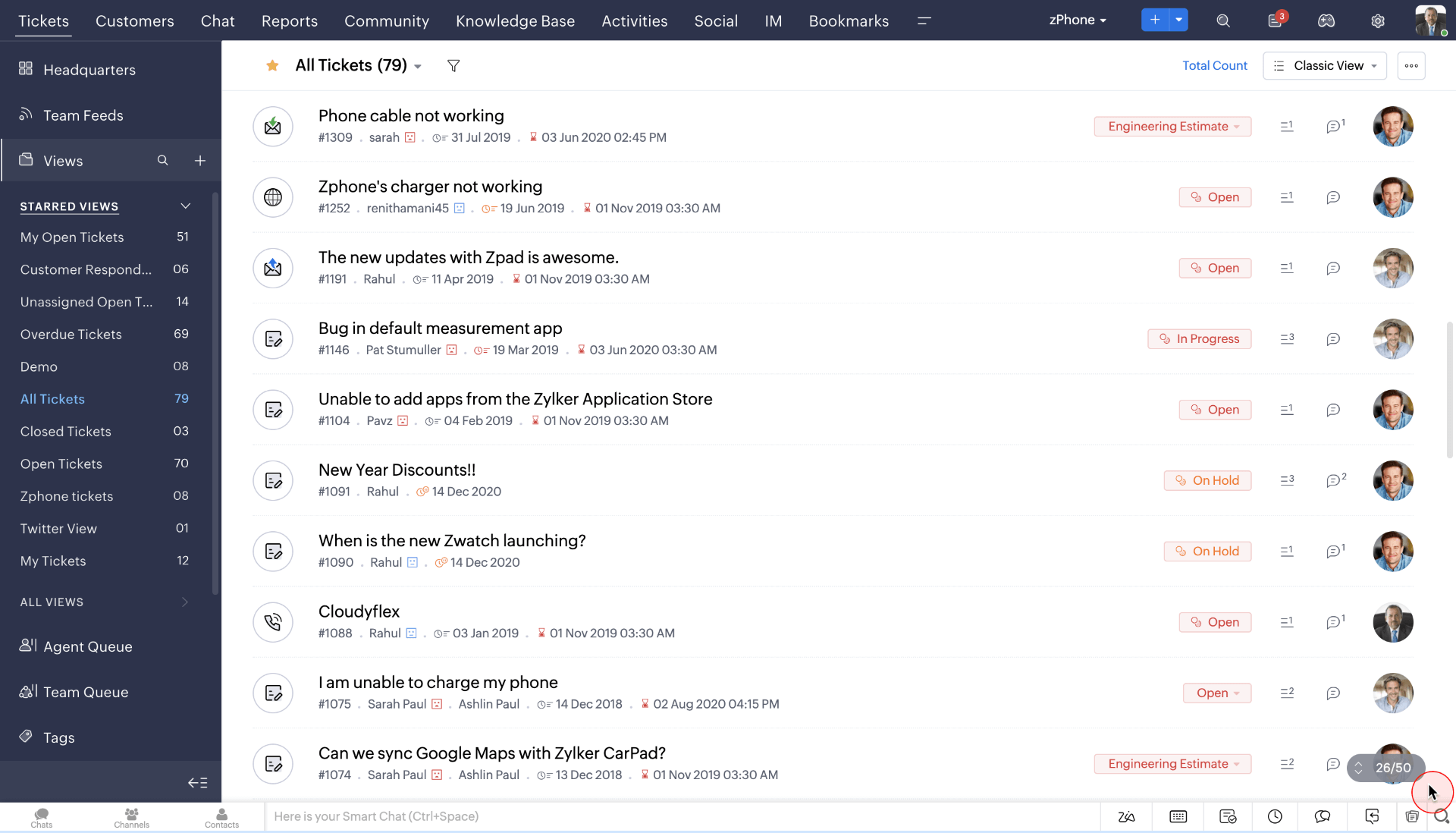
Zoho Desk has been my go-to when it comes to offering contextual support. It’s a great alternative to eDesk for teams that need to provide relevant, personalized service to each customer.
The tool allows agents to see the full customer history, giving the context needed for better resolutions. I find its AI feature, called Zia, quite impressive. It does a great job of suggesting solutions based on previous interactions, speeding up response times.
The platform integrates seamlessly with Zoho CRM, giving teams a 360-degree view of customer interactions. When handling complex tickets, this context-driven approach makes all the difference in providing the right answers and elevating the customer experience.
What You Will Like:
- Zoho Desk offers AI-powered features that assist in ticket routing and prioritization.
- The platform is highly scalable, making it suitable for businesses of all sizes.
- It integrates seamlessly with the entire Zoho suite, allowing for better business operations management.
- The platform includes mobile apps, allowing teams to manage support on the go.
- Its self-service portal allows customers to resolve issues on their own, reducing the ticket load.
What You May Not Like:
- The reporting tools, while functional, are less detailed compared to premium competitors.
- Zoho Desk lacks a built-in CRM, meaning additional costs if CRM functionality is required.
Pricing:
Starts at $25/organization/month. Billed annually.
4. LiveAgent – Best for Chat-Based Support
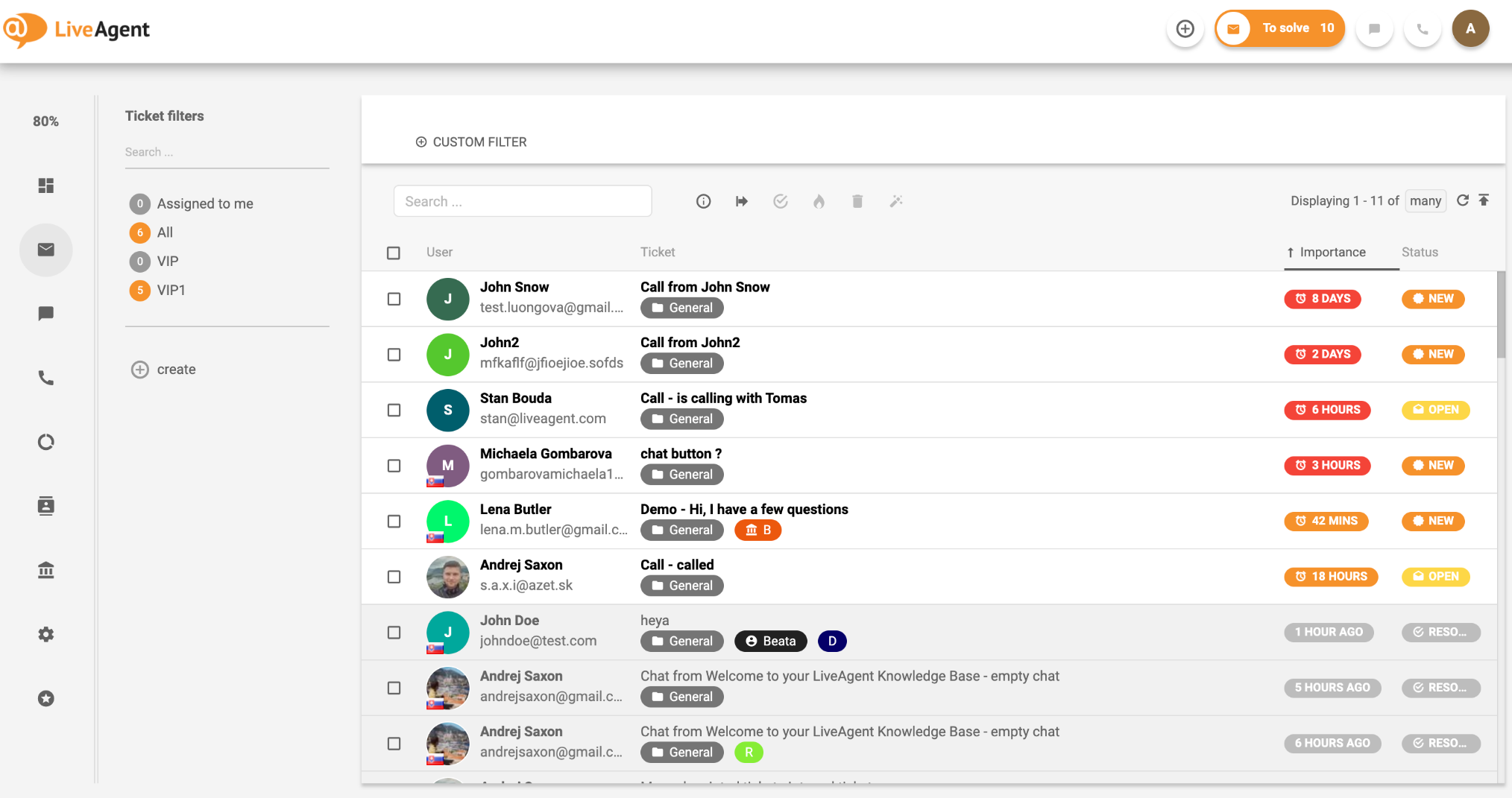
LiveAgent, in my experience, is hands down the best for chat-based support. Unlike eDesk, LiveAgent truly excels in real-time communication. I used it to manage customer queries with live chat widgets, and the immediate interaction helped reduce ticket volume.
The ability to handle multiple chats simultaneously and escalate them to tickets when needed makes it incredibly efficient. One of its key strengths is the integration of multiple channels—emails, calls, and social media—into a unified platform.
What You Will Like:
- LiveAgent offers unlimited ticketing, ensuring no restrictions on the number of customer queries.
- The platform supports over 130 integrations, making it one of the most versatile tools on the market.
- It includes a built-in call center feature, which makes it a one-stop shop for all communication needs.
- LiveAgent supports video calls, adding a personal touch to customer service interactions.
- The software provides gamification features, encouraging team performance.
What You May Not Like:
- Some users report slow response times from customer support for the product itself.
- The mobile app could use improvement in functionality and stability.
Pricing:
Starts at $9/agent/month. Billed annually.
5. OneDesk – Best for Time Tracking on Support Tickets
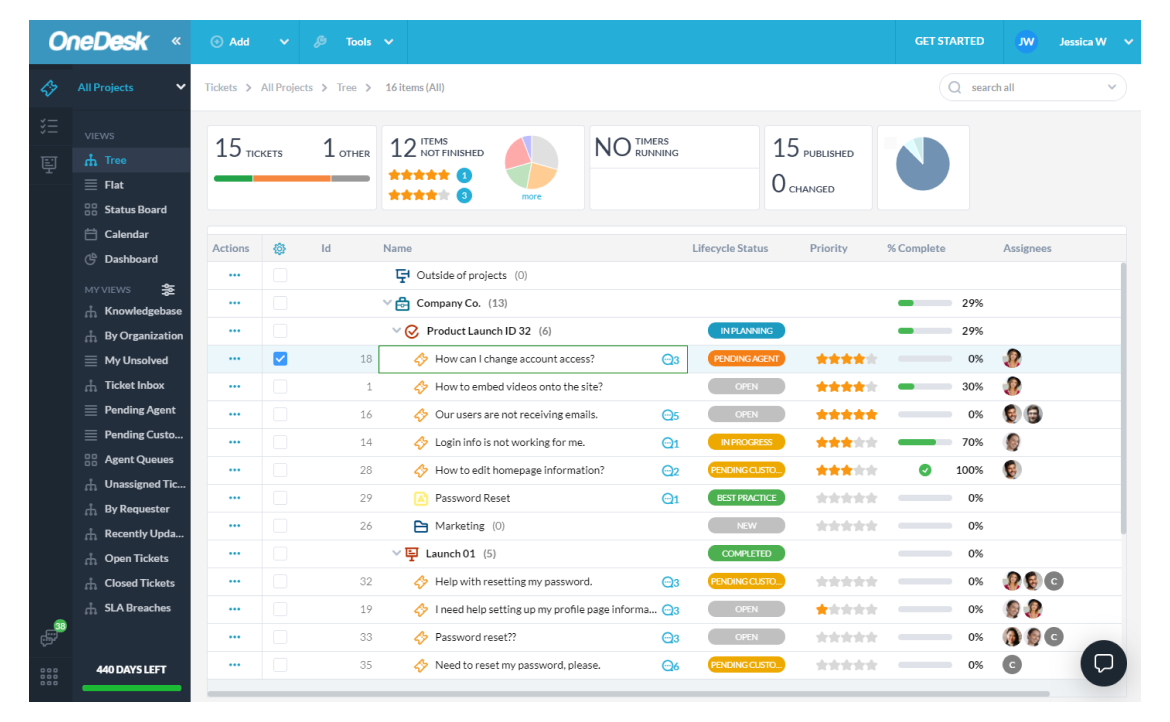
Image Source: Appvizer
I’ve always found OneDesk to be a strong alternative to eDesk, especially when it comes to time tracking. It’s one of the few tools that not only helps you manage support tickets but also monitors the time spent on each task.
This was crucial for my team when we needed to track billable hours and ensure efficient use of resources. With OneDesk, I could generate detailed reports on how long it took to resolve tickets, allowing us to spot bottlenecks in the workflow.
This feature is excellent for service-based businesses that need to keep a close eye on time management and client billing.
What You Will Like:
- It combines helpdesk and project management features in one tool, which is perfect for hybrid teams.
- It allows for full customization of workflows, tickets, and project management tasks.
- OneDesk includes robust collaboration tools for internal teams working on complex projects.
- It offers advanced reporting, allowing users to track customer support metrics and project progress.
- The tool offers a centralized communication platform to streamline both internal and external communication.
What You May Not Like:
- Limited third-party integrations might restrict its functionality for some teams.
- Support for non-English languages is limited, which may be a problem for global teams.
Pricing:
Starts at $11.99/user/month. Billed annually.
6. Freshdesk – Best for Multichannel Communications
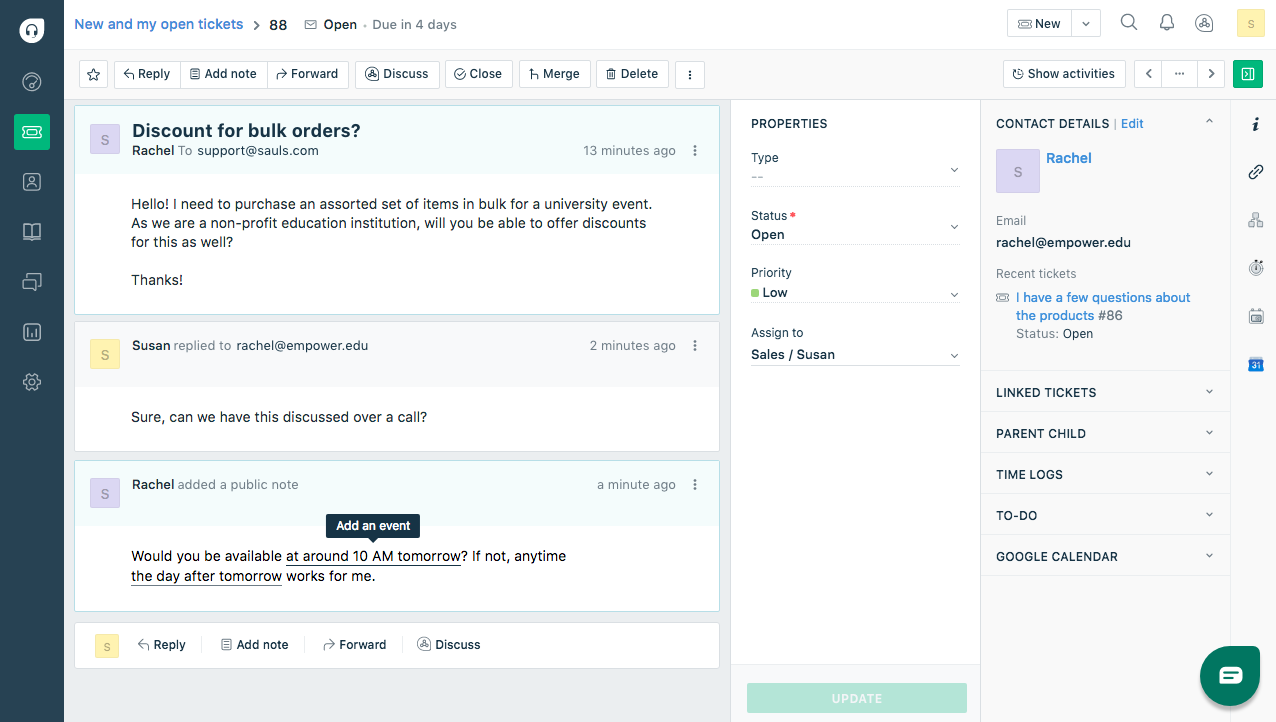
Freshdesk has always been my top pick for handling multichannel communications. If you’re looking for an alternative to eDesk, you’ll love Freshdesk’s ability to unify emails, social media, chat, and phone calls into a single platform. It saved me so much time switching between different channels.
One of its best features is the automation system, which allows for setting up workflows to route tickets efficiently. I found its reporting tools incredibly useful for tracking performance across multiple channels.
If you want to centralize your communications and offer seamless customer service, Freshdesk does this better than most.
What You Will Like:
- The platform includes AI-driven chatbots to automate responses and reduce ticket loads.
- Freshdesk offers customizable reports and dashboards, giving teams deep insights into performance.
- It provides a wide range of third-party integrations with CRM and marketing tools.
- Freshdesk includes multilingual support, which is ideal for global teams.
- The self-service portal is well-designed, helping customers resolve issues without agent assistance.
What You May Not Like:
- You may find the system’s email templates to be overly rigid and difficult to customize.
- The ticketing system can sometimes be slow when handling large volumes.
Pricing:
Starts at $15/agent/month. Billed annually.
7. Zendesk – Best for Large Businesses & Enterprises
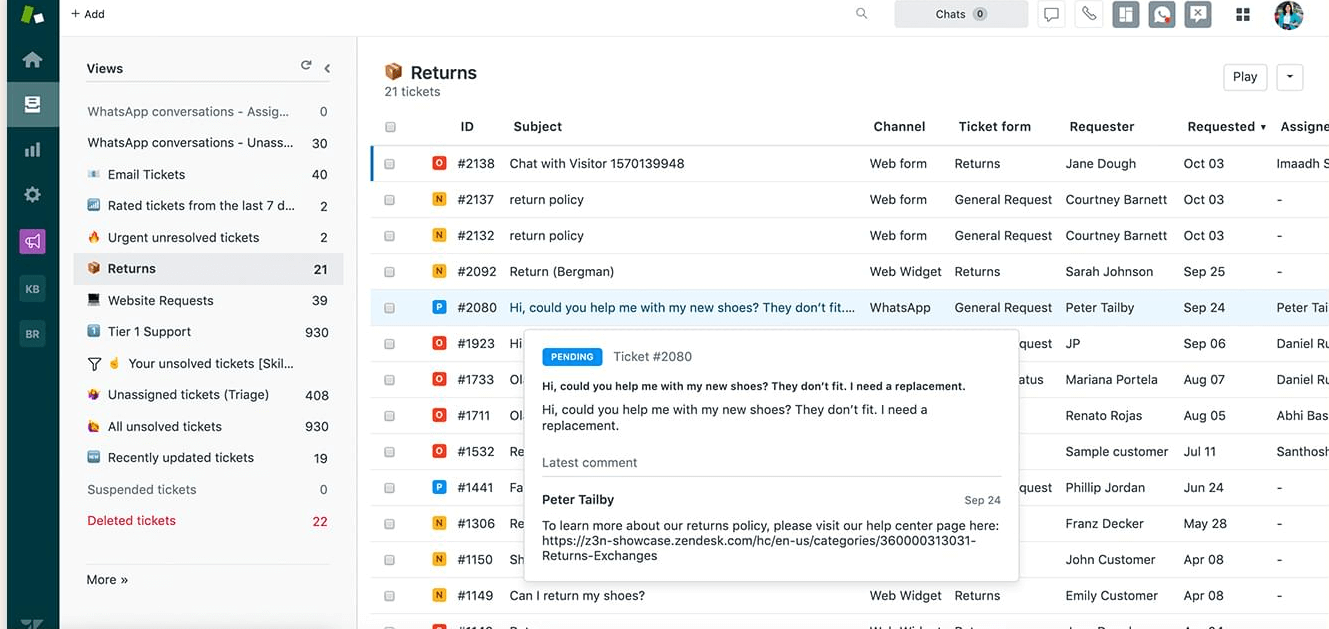
Zendesk is a powerhouse and is built for scale, making it a top alternative to eDesk for enterprises. The tool allows for massive customization, from complex workflows to detailed analytics, and it can handle high volumes of tickets without skipping a beat.
The reporting dashboard gives managers complete visibility over the support process, which I found helpful in optimizing team performance. It integrates with over 1,000 apps and platforms like Slack, Salesforce, and Shopify, enabling seamless collaboration across tools you already use.
If you’re running a large-scale operation, Zendesk’s robust features and scalability make it unbeatable.
What You Will Like:
- The platform supports omnichannel communication, including email, phone, chat, and social media.
- Zendesk offers in-depth analytics and reporting tools to track team performance and customer satisfaction.
- It provides an AI-powered answer bot to automate responses and reduce manual workload.
- The interface is user-friendly, offering a modern, intuitive design.
- It offers a robust knowledge base and community forums, empowering customers to find answers on their own before reaching out for support.
What You May Not Like:
- Zendesk’s advanced features come at a premium cost, which can be prohibitive for small businesses.
- Reporting tools can feel too rigid and lack flexibility for custom insights.
Pricing: Starts at $55/agent/month. Billed annually.
8. Salesforce Service Cloud – Best for AI-Powered Customer Service

Salesforce Service Cloud is a wonderful innovation, particularly when it comes to AI-powered customer service. What sets it apart from eDesk is its AI capabilities, with Einstein AI being the standout feature.
In my experience, it’s quite useful for automating routine queries and provides agents with real-time suggestions, making the support process more efficient. I also loved its seamless integration with Salesforce CRM, which gives a holistic view of customer interactions.
It’s ideal for businesses that want to use AI to offer smarter, faster resolutions while scaling their operations.
What You Will Like:
- It allows for highly customizable workflows to suit any business process.
- Salesforce Service Cloud offers omnichannel support, including phone, chat, email, and social media.
- It provides robust automation features to streamline ticketing, case management, and customer interactions.
- The platform is highly scalable, making it suitable for both small businesses and large enterprises.
- The tool supports seamless integration with third-party apps and platforms.
What You May Not Like:
- Salesforce Service Cloud has a steep learning curve for new users.
- Limited out-of-the-box functionality requires additional customization for advanced features.
Pricing:
Starts at $25/user/month. Billed annually.
Evaluation Criteria
The evaluation of products or tools chosen for this article follows an unbiased, systematic approach that ensures a fair, insightful, and well-rounded review. This method employs six key factors:
- User Reviews / Ratings: Direct experiences from users, including ratings and feedback from reputable sites, provide a ground-level perspective. This feedback is critical in understanding overall satisfaction and potential problems.
- Essential Features & Functionality: The value of a product is ascertained by its core features and overall functionality. Through an in-depth exploration of these aspects, the practical usefulness and effectiveness of the tools are carefully evaluated.
- Ease of Use: The user-friendliness of a product or service is assessed, focusing on the design, interface, and navigation. This ensures a positive experience for users of all levels of expertise.
- Customer Support: The quality of customer support is examined, taking into account its efficiency and how well it supports users in different phases – setting up, addressing concerns, and resolving operational issues.
- Value for Money: Value for money is evaluated by comparing the quality, performance, and features. The goal is to help the reader understand whether they would be getting their money’s worth.
- Personal Experience / Experts’ Opinions: This part of the evaluation criteria draws insightful observations from the personal experience of the writer and the opinions of industry experts.
Ready to Pick the Best eDesk Alternative?
Choosing the right help desk software depends on your unique business needs, customer service goals, and budget. Each alternative to eDesk brings something valuable to the table, but after thoroughly exploring them all, I found the ProProfs Help Desk tool to be the best alternative.
Its intuitive interface, AI-powered automation features, and ability to scale with growing teams stand out. Plus, the reasonable pricing makes it accessible for businesses of all sizes.
FAQ
What should I consider when choosing an eDesk alternative?
When choosing an eDesk alternative, consider the scale of your business and the channels you need to support (email, chat, social media). Integration with existing tools like CRM or eCommerce platforms is key. Evaluate the automation capabilities, as they can reduce manual tasks. Scalability matters, especially for growing businesses, and a good analytics dashboard will help monitor performance. Lastly, ensure the tool fits your budget while delivering the essential features required for your support needs.
FREE. All Features. FOREVER!
Try our Forever FREE account with all premium features!


 We'd love your feedback!
We'd love your feedback! Thanks for your feedback!
Thanks for your feedback!



